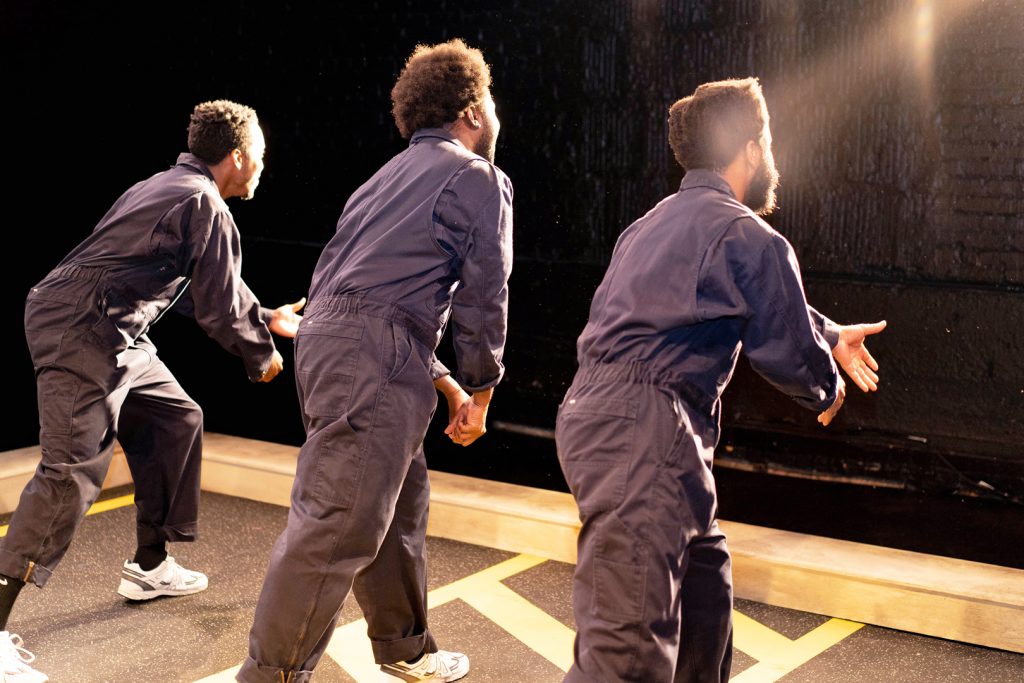The machine at the center of Kafka’s In The Penal Colony carves a man’s unnamed crime into his back until, in a moment of epiphany heralding death, he realizes what he has done. It’s a story heavy on exposition, the bulk of the text consisting of a detached, almost pedantic account of the workings of the machine. It reads like a case study in “the banality of evil,” predating Arendt’s thesis by nearly half a century. Yet this story continues to seize imaginations. It stirred mine as a child when my father read it aloud, on the condition that I promise not to tell my mother (I told). It inspired William Glass to compose an opera that moved and disturbed me at The Polish National Opera in Warsaw a decade ago. And it informed writer/director Miranda Haymon’s fascinating and frenetic stage adaptation, which premiered Wednesday at the New York Theatre Workshop.
Drawing on post-dramatic conventions while remaining faithful to the story’s linear narrative, Haymon transforms a largely static tale into a dynamic piece of physical theatre centered on the politics of race. A cast of three talented and fully committed African-American actors, Jamar Brathwaite, David Glover, and Dhari Noel, march, sing, dance, shadowbox, shoot hoops, pick cotton. These “coded physicalizations of the black male body over time,” as the playwright describes them, seem to signify the workings of a machine designed to punish men for the crime of being born black.

That, at least, was the reading I arrived at after hours of thought and discussion. Like all good theatre, the play raises more questions than it answers. Are professional sports punishment because they destroy black male bodies or because they encourage young black men to neglect their studies? When the prisoner is paraded to a hip hop song with misogynistic lyrics, is hip hop being celebrated as black liberation or criticized for its frequent misogyny and glorification of violence? Does the conflict between the old commandant and the new, so crucial to Kafka’s story, correspond to an analogous conflict in American politics?
Whenever a text on one subject is enlisted in the service of another, there is always the problem of correspondence. Aspects that don’t quite fit are usually cut or at least backgrounded. On a purely political reading, Kafka’s text is an easy fit for a play about racism and patriarchy. But is In the Penal Colony really about politics? Isn’t politics in Kafka usually a stand-in for man’s relationship to a cruel or absent God? Or is The Castle merely about an incompetent administration and The Trial just a sendup of a corrupt legal system?
Kafka, I argue, uses a specific example of unjust punishment in Penal Colony to illustrate the universal human problem of mortality and existential guilt. Haymon’s adaptation, by contrast, applies this example to the even more specific case of racial injustice. In doing so, the play gains in topical relevance what it loses in universal, metaphysical depth. Is this a trade worth making?

Or does my analysis merely highlight the problems facing a white male writing about race? For me, the problem of race is political. For a black man or woman, I imagine, the problem is ontological. One is black. And this form of being-in-the-world is fundamentally different from mine in ways I can apprehend intellectually, esthetically, etc., but never experience from within. If so, what am I, and the largely white audience in attendance last night, supposed to take from Haymon’s In the Penal Colony? Is it even for us?
On a purely theatrical level, the play works extremely well. Emmie Finckel’s set is nothing short of phenomenal. Part prison yard, part playing field, the asphalt-colored ground is striped with yellow police lines and flanked on either side by bleacher seats. The machine controller reads like an old DJ console. And in an eloquent allusion to the needles in Kafka’s machine, the upstage walls bristle with pinprick holes that sparkle when backlit. Equally impressive were Cha See’s lighting and Valentina Monfeuga’s sound design. LED strip lights bordering the floor reinforce the show’s rigorous color scheme in perfect synch with evocative sound effects and music. Subtle touches abound, for example, lights that blaze from under the bleachers at key moments, or a hip hop beat that fades until it sounds like muffled music bleeding in from a block party.

And I’ve rarely seen actors so invested in a play, or a play that demands so much of its actors. The elaborate choreography is flawlessly executed to the point of exhaustion by all three. But if I had to draw distinctions, it would be on the character front. As The Condemned, David Glover stands out as a suffering actor on par with Ryszard Cieslak , Grotowski’s favorite martyr. In a repeated sequence, Glover is forced to drink bottles of green Gatorade, a task he performs agonizingly slowly with a kind of panicked submissiveness that makes us feel uncomfortably complicit in his martyrdom. Dhari Noel delivers a solid performance as The Traveler, pointedly questioning Jamar Brathwaite’s Officer and ultimately driving him into the arms of his own infernal machine. I only wished that Brathwaite had made more of an effort to identify with his character. His performance plays mostly as a critique of the Officer. The script condemns the Officer—figuratively and literally. The actor’s job, like a lawyer’s, is to defend him.
This minor objection aside, I would not hesitate to recommend Haymon’s In the Penal Colony to fans of Kafka, advocates (and critics) of identity politics, and anyone looking to witness avant-garde New York theatre at its most socially relevant and artistically ambitious.
Running through July 28 at NEXT DOOR AT NYTW. Visit www.nytw.org for details.

